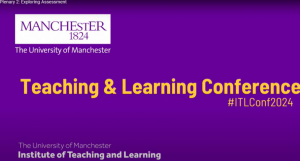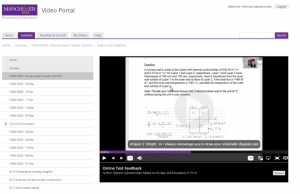Rethinking Assessment and Feedback: Reflections from Teaching & Learning Conference
 Wennie is a teaching-focused lecturer in chemical engineering within the Faculty of Science and Engineering. She is the Deputy Programme Director for the undergraduate programme since 2022 and will commence her new role as Deputy Admissions Lead and Outreach Officer in September 2024. Wennie was recently awarded Senior Fellow of the Higher Education Academy (SFHEA). She is passionate about incorporating student voice through partnership projects, promoting social responsibility via outreach activities, and implementing innovative teaching and learning methods, such as the ethical use of AI and digital tools. This blog shares her reflections from her participation in a plenary session at the University’s Teaching & Learning Conference and experiences in assessment and feedback. Please click here to watch the podcast of the session.
Wennie is a teaching-focused lecturer in chemical engineering within the Faculty of Science and Engineering. She is the Deputy Programme Director for the undergraduate programme since 2022 and will commence her new role as Deputy Admissions Lead and Outreach Officer in September 2024. Wennie was recently awarded Senior Fellow of the Higher Education Academy (SFHEA). She is passionate about incorporating student voice through partnership projects, promoting social responsibility via outreach activities, and implementing innovative teaching and learning methods, such as the ethical use of AI and digital tools. This blog shares her reflections from her participation in a plenary session at the University’s Teaching & Learning Conference and experiences in assessment and feedback. Please click here to watch the podcast of the session.
Introduction
Alongside esteemed colleagues from across the University, I had the pleasure of sharing my experiences and engaging in meaningful conversations during a plenary session titled “Exploring Assessment” at the University’s Teaching & Learning Conference. I was joined by Dr Jennifer McBride, Dr Miriam Firth, Dr Sally Hickson and Katie Jackson in the panel. Below, I share my key reflections on the subject and actionable insights from an academic perspective.

What Matters Most in Assessment and Feedback?
From an academic perspective, assessments must align with the Intended Learning Outcomes (ILOs) and accreditation standards of the programme, while ensuring fair and consistent marking. It’s important that assessments need to be inclusive, accommodating students with diverse educational backgrounds. The level of difficulty should appropriately challenge students without assuming pre-university knowledge. Implementing diverse and innovative assessment methods, such as AI-assisted tools, podcasts, and video-based assessments, can enhance student inclusivity and engagement in their learning experience.
Feedback should be engaging, transferable and actionable for students to implement in future assessments and their career. From personal experience, I have found success in combining video feedback with written feedback. These feedback videos were structured to emphasise common strengths and areas for improvement across the cohort, providing a comprehensive overview that benefited all students.
Addressing Gaps in Assessment and Feedback
The National Student Survey (NSS) scores for “Assessment and Feedback” highlighted significant areas for improvement. Over-assessment often leads to student burnout and lower quality of work. To address this, our department has attempted to stagger submission deadlines, although this is complex and time-consuming. Additionally, the current focus on marks over learning objectives can undermine the educational process. Encouraging open-ended or project-based assessments can foster creativity and independent problem-solving skills.
Feedback often feels generic and non-transferable, leading to student disengagement. The video feedback strategy I have implemented aims to address these gaps and has received positive responses from students of different year groups. Video feedback serves a more engaging and useful teaching and learning tool, providing detailed explanations likened to a ‘mini lecture’ in a more accessible format for the entire cohort. Students can revisit and review the material at their own pace (Figure 1).

Figure 1: Video assessment feedback with closed caption.
Making Assessment and Feedback Accessible
Accessible assessment practices should include diverse formats to accommodate different learning styles, clear rubrics, and flexible deadlines where feasible. Utilising technology such as text-to-speech software and closed captions can further support diverse needs. Feedback should be personalised and actionable, helping students understand their strengths and areas for improvement in a relevant context.
Developing a Uniquely Manchester Graduate
To develop graduates equipped for real-world challenges, it is essential to incorporate transferable skills into assessments, such as fostering collaboration, peer review, and the use of technology. Additionally, feedback should serve as a learning tool to encourage growth and development instead of perceived as a judgmental process.
Towards an ‘Ideal’ Assessment and Feedback Landscape
An ‘ideal’ and inclusive assessment and feedback landscape at the University of Manchester should include industry-relevant skills, varied assessment methods, flexible deadlines, and constructive feedback facilitated by tools such as AI and data analytics. Student engagement in the feedback process, self-assessment, and peer feedback are also pivotal in shaping this landscape.
Tangible Steps Forward
- Review and reduce assessments
Streamline assessments to avoid over-assessment without compromising ILOs.
- Diverse assessment methods
Incorporate oral exams, video- and podcast-based assessments, peer assessments, and real-world problem-solving tasks.
- Innovative feedback
Implement video feedback and peer reviews to make feedback more engaging.
- Feedforward practices
Provide actionable steps in feedback for future assessments to enhance learning.
- Student partnership projects
Engage student voice in assessment design and feedback processes through channels such as internships, research, student representatives and the Student Union.
- Staff training
Enhance awareness of diverse student needs and support for invisible disabilities.
Takeaway Message
We need to align assessments with ILOs, ensure fairness, and adopt innovative methods to boost student engagement and learning. Improvements include reducing over-assessment, making feedback more personalised, and using diverse formats to support inclusivity. By integrating transferable skills and utilising feedback as a growth tool, we can prepare students for real-world challenges. Streamlining assessments, diversifying methods, and fostering student partnerships are essential steps towards an ideal assessment and feedback landscape.
By Wennie Subramonian
Email: wennie.subramonian@manchester.ac.uk
LinkedIn: www.linkedin.com/in/wennie-subramonian-w3nn13
More Reading:







0 Comments